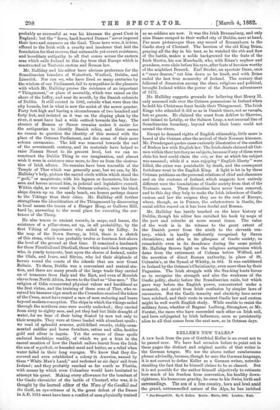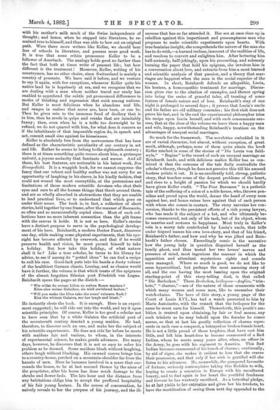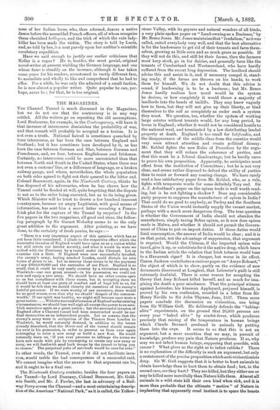KELLER'S NEW TALES.*
A NEW book from the pen of Gottfried Keller is an event not to be passed over. We have had occasion before to point out in these pages the distinct and original merits of that writer in the German tongue. We use the above rather cumbersome phrase advisedly, because, though he uses the German language, it is not correct to define Keller as a German writer, notwith- standing the fact that he himself claims to be so classed. But it is not possible for the author himself objectively to estimate how much of his freedom from convention, his healthy down- rightness, his humorous gravity, he owes to his Swiss birth and surroundings. The son of a free country, born and bred amid the grand, untrammelled nature of the Alps, he has imbibed
• This Sinnescliclit. By G. Keller. Berlin : Hertz, 1882. London: Nutt.
with his mother's milk much of the Swiss independence of thought ; and hence, when he stepped into literature, he re- mained true to himself, and thus was able to hew out an original path. Were there more writers like Keller, we should hear less of schools in literature, and possess more good work. It is true that some critics pronounce Keller to be a follower of Auerbach. The analogy holds good no farther than the fact that both at times write of peasant life ; but how different is the treatment ! Moreover, Keller, writing of his countrymen, has no other choice, since Switzerland is mainly a country of peasants. We have said it before, and we venture to say it again, with few exceptions, whenever Keller quits his native land he is hopelessly at sea, and we recognise that we are dealing with a man whom neither travel nor study has enabled to apprehend the subtle yet pronounced differences in modes of thinking and expression that exist among nations. But Keller is most felicitous when he abandons real life, and ranges in realms that never are, have been, or can be. Then he gives rein to the immense fund of drollery that is in him, then he revels in quips and cranks that are inimitably fanny; then, even when he is a trifle too downright to be refined, we do not quarrel with him, for what does it concern us if the inhabitants of that impossible region do, in speech and act, commit small sins against lee bienseances.
Keller is absolutely free from the nervousness that has been defined as the characteristic peculiarity of our century in art and life. Rather he seems to belong to the eighteenth century ; there is at times something quite rococo about him, a grotesque naivete, a joyous audacity that fascinate and amuse. And all these, his best features, are noticeable in his latest work, Das Sinngedicht. It is a waggish book; for we cannot suppress the fancy that our robust and healthy author was not sorry for an opportunity of laughing in his sleeve, in his kindly fashion, that could not wound the most susceptible, at the pretensions and limitations of those modern scientific devotees who shut their eyes and ears to all the human things that throb around them, and are so wholly absorbed in abstractions that they are unable to lead practical lives, or to understand that which goes on under their noses. The book is, in fact, a collection of short stories, held together by one frame, after the manner of Boccaccio, so often and so unsuccessfully copied since. Most of such col- lections have no more inherent connection than the gilt frame with the canvas it holds. It is not so here. Keller's stories have a distinct purpose to serve in the psychological develop- ment of his hero. Reinhardt, a modern Doctor Faust, discovers one day, while making some physical experiments, that his eye- sight has become affected by overwork, and that if he would preserve health and vision, he must permit himself to take a holiday. But how take this holiday, of what nature shall it be P Like a true scholar, he turns to his library for advice, to see if among its " potted ideas" he can find a recipe to suit his case. Good-luck puts into his hands a dusty volume of the healthiest German classic, Leasing, and as chance would have it further, the volume is that which treats of the epigrams of the almost forgotten Silesian poet Friedrich von Logau. Reinhardt opens the pages at the distich :-
" Wie willst du weisse Lilien zn rothen Rosen machen ?
Russ eine weisse Galathee, sic wird errOthend lachen." " Will you make the lilies Lake the roses' crimson Hush ?
Kiss the whitest Galatea, see her laugh and blush."
He instantly shuts the book. It is enough. Here is an experi- ment suggested ; he will ride out into the world, and try it upon scientific principles. Of course, Keller is too good a scholar not to have seen that by a white Galatea the artificial poet of the seventeenth century denoted a young maiden. He had, therefore, to discover such an one, and make her the subject of his scientific experiments. He does not ricli far before he meets with maidens fair and various, to whom, in the interests of experimental science, he makes gentle advances. Ere many days, however, he discovers that it is not so easy to solve his problem as he deemed. Some maidens blush without laughing, others laugh without blushing. His onward course brings him to a country-house, perched on a mountain-shoulder far from the haunts of men. Here he becomes involved in a maze that sur- rounds the house, to be at last rescued thence by the niece of the proprietor, after his horse has done much damage to the shrubs and flower-beds. The late hour and the distance from any habitations oblige him to accept the proffered hospitality of his fair young hostess. In the course of conversation, he naïvely reveals to her the purpose of his journey, and the ill-
success that has so far attended it. Her sex at once rises up in rebellion against this impertinent and presumptuous man who proposes to make scientific experiments upon hearts. With true feminine insight, she comprehends the nature of the man she has to do with,—a learned recluse, innocent of the realities of life, and resolves to convert and enlighten him. After lecturing him half-serionsly, half-jokingly, upon his proceeding, and solemnly burning the paper that held his epigram, she involves him ire a conversation about love, and extracts from him a. most learned and scientific analysis of that passion, and a theory that mar- riages are happiest when the man is the social superior of the woman. In short, Reinhardt defends an allopathic, Lucia, his hostess, a homoeopathic treatment for marriage. Discus- sion gives rise to the citation of examples, and thence spring into being the series of graceful tales, all treating of some feature of female nature and of love. Reinhardt's stay of one night is prolonged to several days ; it proves that Lucia's uncle and his father are old military comrades ; his first visit does not prove his last, and in the end the experimental philosopher tries his recipe upon Lucia herself, and with such consummate suc- cess, that at the close of the volume we leave them a happy mart and wife, happy, notwithstanding Reinhardt's treatises on the advantages of unequal social marriages.
So much for the framework. The novelettes embedded in it are of varied character, but almost, without exception, of great. merit, although, perhaps, none of them quite attain the level Keller reached in some of the stories of " Die Lents von Seld- wyla." " Regina" is the record of such an unequal marriage as Reinhardt lauds, and with delicious malice Keller has so con- trived it that the outcome of the tale flatly contradicts the scholar's theory, though he does not perceive this till his amused hostess points it out. It is an excellently told, strong, pathetic. story, that touches some of the deepest problems of the heart,. and rises to a height of passion for which we should hardly have given Keller credit. " The Poor Baroness " is a pathetic tale of the suffering of a scion of a noble house, who, thrown pen- niless and proud upon the world, deems the hand of every man' against her, and hence raises hers against that of each person with whom she comes in contact. The story narrates her con- version, thanks to the persistent efforts of a rich young lawyer,. who has made it the subject of a bet, and who ultimately be- comes enamoured, not only of his task, but of its object, whom he marries and restores to happiness. Most truly in Keller's vein is a merry tale contributed by Lucia's uncle, that tells under feigned names his own love-story, and that of his friend,. Reinhardt's father, and how and why he was jilted and Rein- hardt's father chosen. Exceedingly comic is the narrative how the young lady in question disguised herself as the family ghost, and thus tested her two lovers' nerves and presence of mind, most ingenious the manner in which the apparition and attendant mysterious sights and sounds were managed. Where so much is good, we do not like to seem hypercritical, but perhaps the most amusing story off all, and the one having the most bearing upon the original starting-point of this story-telling duel, is that called "Die Berlocken." These Berlocken, braoques—Anglice, "trin- kets," " charms,"—are of the nature of those ornaments with which many women and some men, like to encumber their watch-chains. The hero of this story, a young page of the Court of Louis XVI., has had a watch presented to him by Marie Antoinette, with the remark that the broloques for the same he must earn for himself. Thenceforth, this youth's am- bition is centred upon obtaining, by fair or foul means, any such trinkets as he may behold upon the females he comes across, so that at last his goodly collection of charms repre- sents in each case a conquest, a betrayed or broken female heart. He is not a little proud of these trophies, that have cost him little, and left him heart-free to become enamoured of a Red. Indian, whom he meets many years after, when, an officer ins the Army, he goes with his regiment to America. This Red Indian becomes enamoured of his bunch of charms ; continually, by aid of signs, she makes it evident to him that she craves. their possession, and that only if her wish is gratified will she listen to his advances. He, meanwhile, the pampered favourite of fortune, seriously contemplates taking this Redskin to wife, hoping to create a sensation in Europe with his uncultured beauty, and to find again in her heart the youthful freshness and fervour he has wantonly sacrificed. As a betrothal pledge, he at last yields to her entreaties and gives her his trinkets, to have the mortification of seeing them next day appended to the
nose of her Indian lover, who, thus adorned, dances a native dance before the assembled French officers, all of whom recognise these cherished hi-Rogues, and the trick of which the vain lady- killer has been made the victim. The story is told by Lucia, and, as told by her, is a neat parody upon her auditor's scientific osculatory expedition. Have we said enough to justify our earlier criticisms that Keller is a rogue ? He is, besides, the most genial, original novel-writer at present wielding the German language, and one whose fame is steadily on the increase, although it has taken some years for his readers, accustomed to vastly different fare, to assimilate and wholly to like and comprehend that he had to offer. For a while, he was only the admired of a small faction, he is now almost a popular writer. Quite popular he can, per- haps, never be ; for that, he is too original.




































 Previous page
Previous page